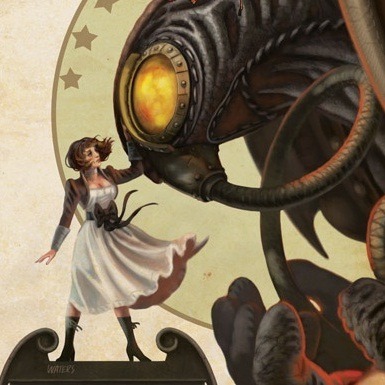When Gamers Get Old

Video games and I grew up together. We blew up spaceships, head-butted bricks full of coins, and jump-kicked multicolored ninjas who disappeared when they were defeated. Now I wonder if games will grow old with me.
My first video game was Super Mario Bros. of course. Others that stand out from my childhood include Teenage Mutant Ninja Turtles Arcade, The Legend of Zelda, Goldeneye, and then Halo. In all of these games the goal was some variation on kill the villain and save the girl. That’s still the carrot and stick of lots of games, but recently I’ve noticed a new dynamic emerging. More and more, the motivation for video game heroes is not romantic, but paternal.
Dishonored, The Walking Dead: Season 1, The Last of Us, and Bioshock Infinite all came out within the last year, and the protagonist of each game is chiefly concerned with the safety of a child. In some cases it’s actually their own son or daughter, but these games aren’t love stories. The big moments all play on our desire to protect our own, and even to shield them from violence. Bioshock Infinite was the first time I felt guilty because the younger character I was escorting was a witness to all the blood and mayhem.

The emergence of fatherhood as a theme in games is surely due to changing demographics in the market. The Entertainment Software Association reports that the average gamer in 2013 is 30 years old and has been a gamer for just over a dozen years.
I am that average gamer—out of college, working, maybe gaining a few pounds, and often gaming with a sleeping infant balanced in my arms. No wonder there are fewer prepubescent elves saving pink-dressed princesses in games these days.

So I’ve grown up, and now there are games that tap into my newfound paternal instincts. I still enjoy saving the princess now and again, but more and more I’m drawn to grizzled protagonists, like the married outlaw in Red Dead Redemption, whose teenage son gives him no end of grief.
As my generation continues to age, I wonder if video games will keep up.
Usually, as you progress through a game, your character gains strength and abilities. You might start off with a weak jump at level one, but you’ll be flying by level ten. It’s a good mirror for growing up, gaining powers like a driver’s license and your first apartment.
What about when I’m sixty? Will there be games that explore the idea of losing power and strength as you go? What if at level one you can run, but by level three it’s hard to even jog? And forget about climbing over anything. Will my vision blur? My hearing deteriorate? Will I try and fail to protect my grandchildren from a zombie because arthritis has crippled my trigger finger? I’d play that game, but there must be better material than that in the theme of growing old, and I hope game makers seek it out in the decades to come.